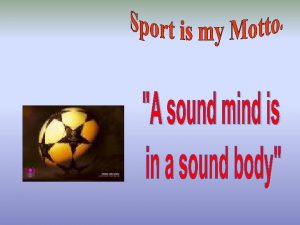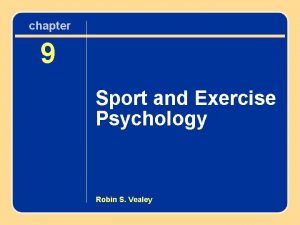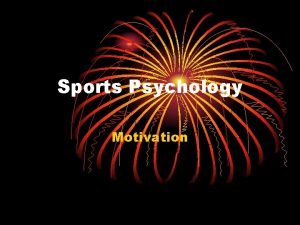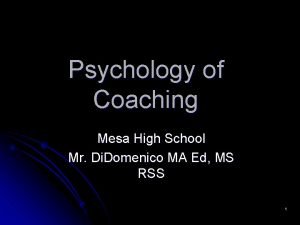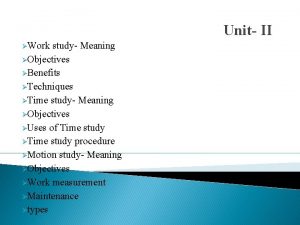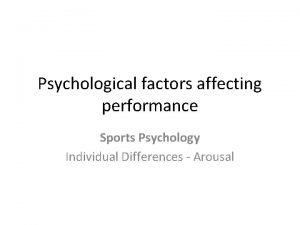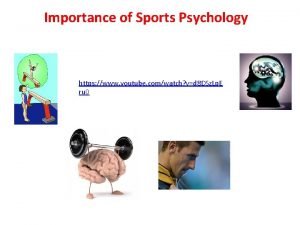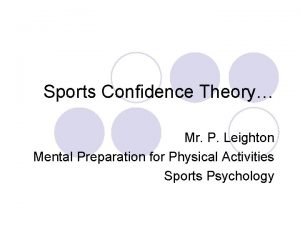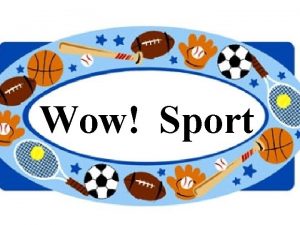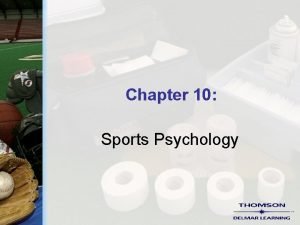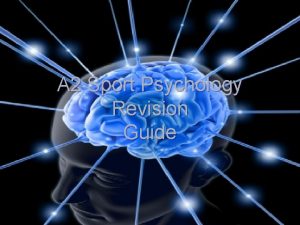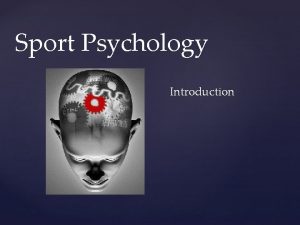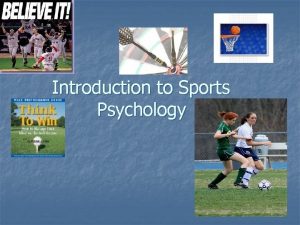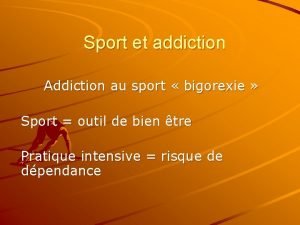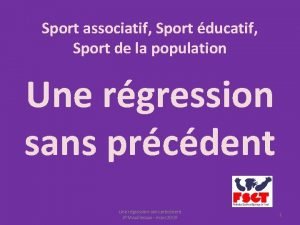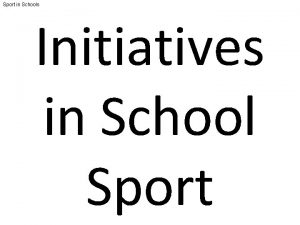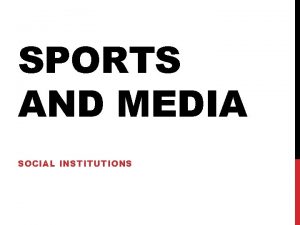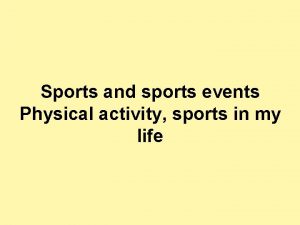Sports Psychology Sports Psychology study of sport and




















- Slides: 20

Sports Psychology

• Sports Psychology – study of sport and exercise, and the mental factors influencing performance – Purpose: to improve performance and self-image • Athletes physically prepare all the time but often forget the mental aspect of their sport • It is often said that 95% of the “game” is mental

• Historically athletes only sought psychological help when they had a problem • Today it is a booming field – They guide athletes to find increased success and happiness • • • Goals Self-confidence Motivation Positive self-image Strategies to cope with stress and disappointment

Motivation • Motivation – an internal state or conditional (sometimes described as a need, desire, or want) that serves to activate or energize behavior and give it direction • Two types – Extrinsic – from the outside • External reward ($ or praise) based on goals, interest, and values of others – Intrinsic – from within yourself • Behavior for its own sake, requires not external support or reinforcement – Examples: personal achievement, enjoyment, self-confidence

Goal Setting • Goal Setting – Identifying clearly defined, specific objectives that are measurable – Gives a long-term vision & short-term motivation – By setting specific goals • Can measure progress • Take pride in achievement of those goals

• With goals – individuals can – Achieve more – Improve performance – Improve quality of training – Increase motivation to achieve at a higher level – Increase pride and satisfaction in performance – Improve self-confidence

• Research has shown that people who use goal setting effectively: – Suffer less from stress and anxiety – Concentrate better – Show more self-confidence – Perform better – Are happier with their performances • By setting goals – the athletes will understand the level he wishes to reach and the skills needed to achieve it

When setting goals…. • Express Goals Positively – Set positive goals not negative • Example: By Oct 30 th I will be able to run 2 miles. • Set Priorities – If you have several goals, put them in order of importance • Write goals down – Avoid confusion, and give goals more power – Goals should be written down and visible

• Keep Operational Goals Small – These are the mini-goals that help accomplish the larger goals • Large Goal – Run a Marathon • Mini-goal – Be able to run 2 miles by end of month • Set Performance, Not Outcome Goals – Performance Goal – improve run speed by end of month – Outcome Goal – Run 1 mile in 5 minutes by end of month • Set Specific Goals – Goals must be measurable

• Set Goals at the right level – Set goals that are a little out of your reach not a lot • Example: Run 4 miles vs. run a marathon – Take into account factors that will prevent from reaching your goal such as: • Fatigue, injury, time • Set Short-term and Long-Term Goals – Short-Term Goals – goal that can be reached within a few months or less. Must be specific – Long-Term goals – a goal that you can reach in the distant future. Write them down, review periodically and reevaluate as needed

Stress • Stress – Some factor that causes awareness, anxiety, focus, or fear; stress can be either good or bad and have both positive and negative effects • Positive – Increase awareness – Maintain clearer focus – Increase motivation – Filter out distractions • Too much stress will hinder performance

• Transitional Stress: Transitions between levels – Facing the unknown • Increased competition • New teammates • Adjusting to the change in level – Often occurs to when: • • Beginning a new sport Going from high school to college, college to pros Changing leagues Retiring from sports

• Injuries – Usually takes them out of competition – Set them back in training and performance – Athletes must modify goals when injured • Burnout: mental and physical exhaustion that causes an athlete to drop out of a sport or quit an activity that was once enjoyable

• Causes of Burnout – Pressure to win – Criticism from coaches, parents, other teammates – Start being competitive at very young age • Stress of early/late practices • Lack of normal social life • Most people who quit due to burn out usually are physically able to continue but not mentally

• Did you know…. . – 80% of children who participate in youth sports dropout by the time they are 15 • Why? – Parents enroll too early in competitive sports • Kids not emotionally able to handle the pressure • Do not fully understand the sport or competition – Achieve success too early – Parents/Coach’s emphasize winning too much not fun – Limited to 1 sport or competitive in too many sports

• Other causes of stress in sports – Gender issues • Girls in sports perceived to be too masculine • Boys in sports perceived to be too feminine

Managing Stress • Negative effects of stress can interfere with judgment and fine motor control • The more stress an athlete has, the more of their mental energy will be consumed • How to manage stress? – – – Set Goals Meditation Positive Thinking Time Management Take breaks Talk about it

Self-Confidence • Probably the most important attribute an athlete can have – Reflects their self-worth – Determines one happiness in life • Sports can… – Be highly positive in improving self-worth OR – Be highly negative in damaging it

• Those with self-confidence…. – tend to take risks because they can take it when it goes wrong • Children who are forced to play sports they do not like it can be destructive – Can lead to lack of self-esteem • Self-confidence needs to be realistic

• Under confidence – Suffer from fear of failure, self-doubt, negative thinking, and lack of concentration • Over confidence – Can be dangerous – Expectations are not based on ability
 Outdoor and indoor sports
Outdoor and indoor sports Sport and exercise psychology definition
Sport and exercise psychology definition Sport obermeyer case study
Sport obermeyer case study Wally obermeyer
Wally obermeyer History of sport psychology
History of sport psychology Definition of motivation in sport psychology
Definition of motivation in sport psychology Educational sport psychology specialists
Educational sport psychology specialists Process of method study
Process of method study Objectives of work study
Objectives of work study Difference between time study and motion study
Difference between time study and motion study The inverted u theory
The inverted u theory Youtube sports psychology
Youtube sports psychology Catastrophe theory sports psychology
Catastrophe theory sports psychology Vealey's model of sports confidence
Vealey's model of sports confidence Norman triplett sports psychology
Norman triplett sports psychology Case series
Case series Retrospective cohort study vs prospective cohort study
Retrospective cohort study vs prospective cohort study Study less study smart
Study less study smart Phytogeography of india
Phytogeography of india Vce psychology study design
Vce psychology study design What is longitudinal study in psychology
What is longitudinal study in psychology
